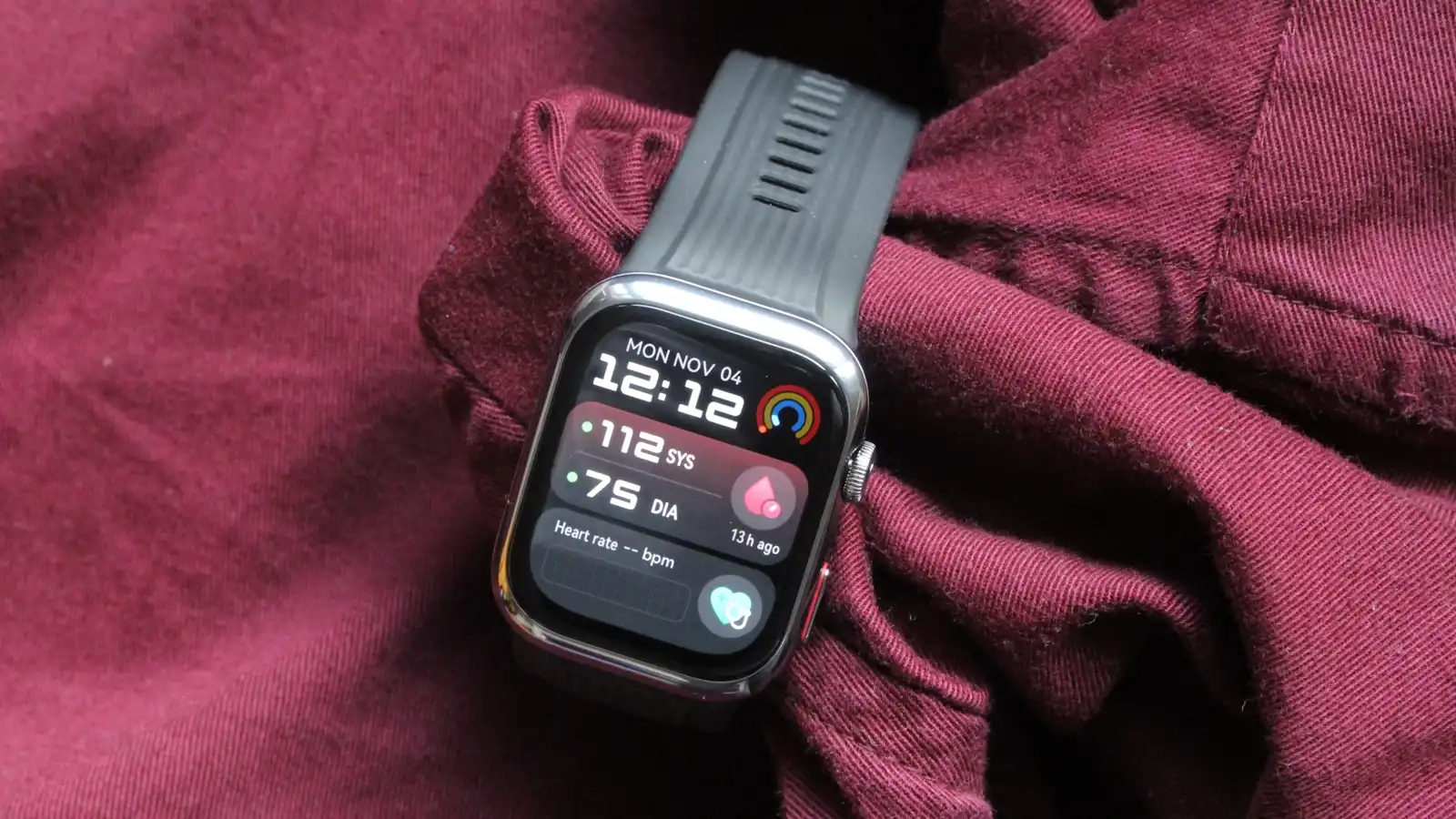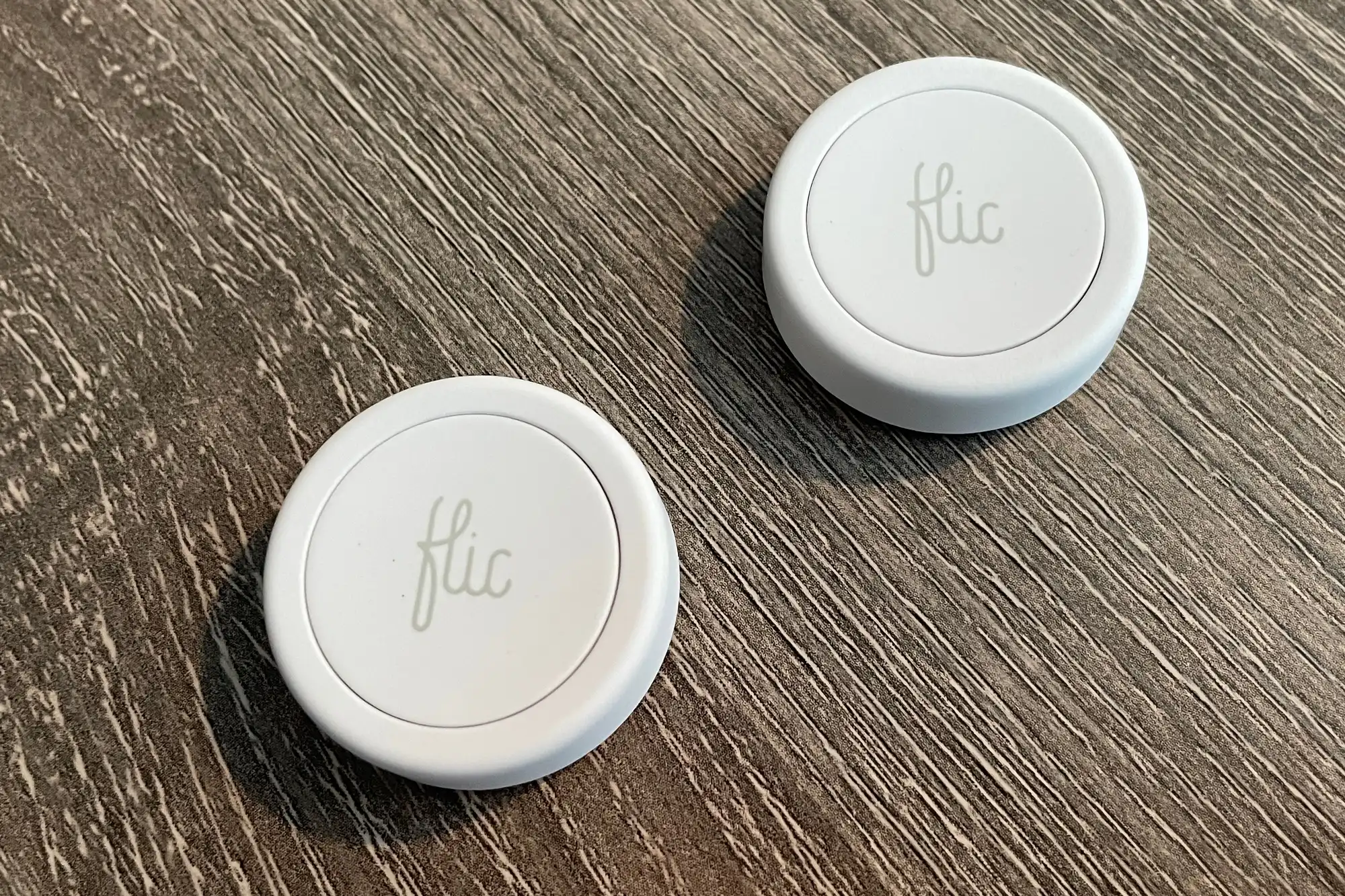Active noise cancellation is the biggest difference, but your design preference and budget are also important to consider.
Trying to decide between Apple’s AirPods 3 and AirPods Pro 2? There are a lot of differences between the two models, but you can start by asking yourself two questions. Do you prefer active noise cancellation in a noise-isolating design? Or are you a fan of open earbuds that don’t require you to jam silicone ear tips into your ears?
Yes, there’s a price difference — the AirPods Pro 2 sell for about $200 online (regularly priced at $249), while the AirPods 3 cost about $150. It’s also possible that we’ll see upcoming sales during the Black Friday and Cyber Monday weekend. But with only around $50 usually separating the two AirPods models, it’s probably more important to focus on those key differences rather than dwelling too much on price.
Apple has bridged the gap between its Pro and regular AirPods by upgrading the AirPods 3’s design — it now looks more like the Pro’s design minus the silicone ear tips — and it has an IPX4 splashproof water-resistance rating. Additionally, the AirPods 3, like the AirPods Pro and Pro 2, also have Apple’s spatial audio with head-tracking feature.
But there are still certain benefits you can only get on the pricier AirPods Pro 2, the biggest being active noise cancellation and transparency mode. Multiple ear tip sizes, the ability to swipe up and down to control music volume and ultra wideband support are also exclusive to the Pro 2.
The new AirPods Pro 2 model that Apple launched in September also has dust-resistance, some audio optimizations that should enable them to work better with the upcoming Vision Pro headset and a USB-C charging port, matching the iPhone 15’s. But noise cancellation will likely make the biggest impact in everyday use, and it’s the most important factor to consider.
AirPods Pro 2 vs. AirPods 3
| AirPods Pro 2 (2023) | AirPods 3 | |
|---|---|---|
| Price (USD) | $249 | $169 (Lightning case) |
| Price (UK) | £249 | £179 (Lightning case) |
| Price (AU) | AU$399 | AU$279 (Lightning case) |
| Weight (earbuds) | 0.19 ounce | 0.15 ounce |
| Audio features | Active noise cancellation, Adaptive transparency, spatial audio with dynamic head tracking | Spatial audio with dynamic head tracking |
| Audio technology | Adaptive EQ, custom high-excursion Apple driver, custom high dynamic range amplifier, vent system for pressure equalization | Adaptive EQ, custom high-excursion Apple driver, custom high dynamic range amplifier |
| Durability | IP54 sweat-, water- and dust-resistant | IPX4 sweat- and water-resistant |
| Charging | MagSafe or USB-C | MagSafe or Lightning (extra $10 for MagSafe case) |
| Multiple ear tips | Yes | No |
| Chip | H2 chip, U1 chip in charging case | H1 chip |
| Battery life (earbuds) | 6 hours of listening time | 6 hours of listening time |
| Battery life (case) | 30 hours of listening time | 30 hours of listening time |
| Microphones | Dual beamforming microphones; inward-facing microphone | Dual beamforming microphones; inward-facing microphone |
| Sensors | Skin detect sensor, motion detecting accelerometer, speech detecting accelerometer, touch control | Skin detect sensor, motion detecting accelerometer, speech detecting accelerometer, Force sensor |
| Controls | Hey Siri, touch controls | Hey Siri, Force sensor |
AirPods Pro 2 vs. AirPods 3: Design and case
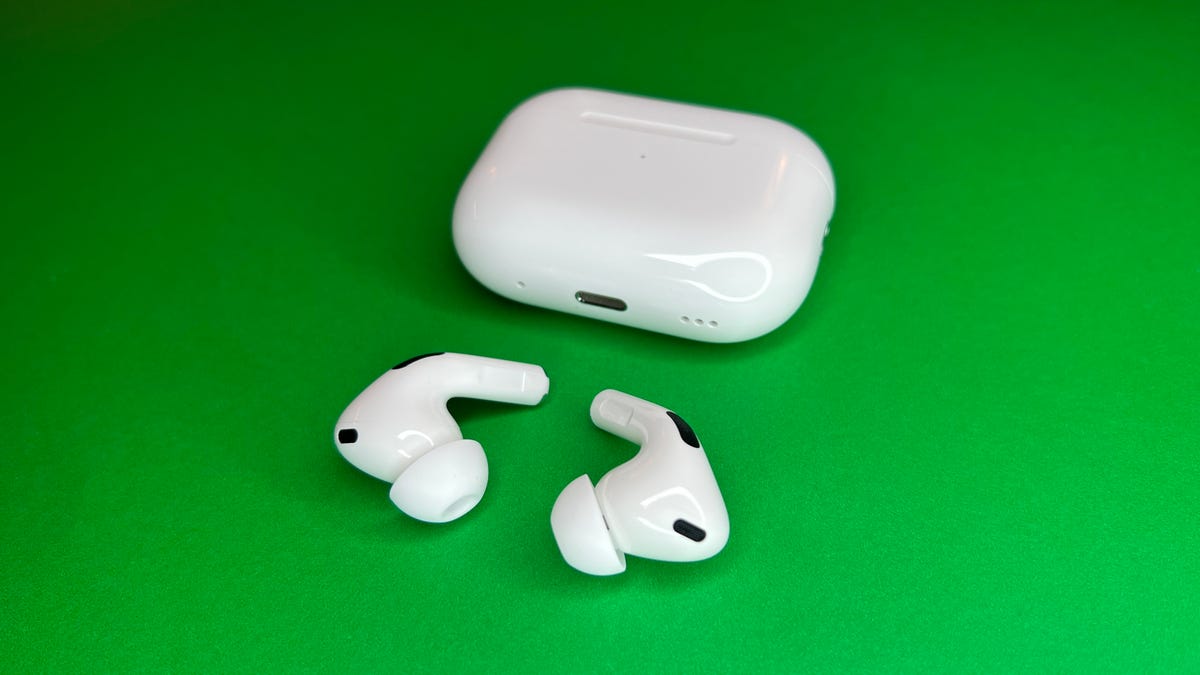
The biggest difference in terms of design is that the $169 AirPods don’t have interchangeable silicone tips like the AirPods Pro 2, which include four sizes to choose from. The AirPods 3 are also lighter than the AirPods Pro 2 at 0.15 ounce (4.3 grams) versus 0.19 ounce (5.3 grams).
The AirPods 3 and second-generation AirPods Pro share some similarities when it comes to design, although it’s very easy to tell them apart. The AirPods Pro 2’s stems, for example, are noticeably shorter than those on the AirPods 3. But both models are sweat and water resistant, which could make them more appealing than the $129 regular AirPods for those who want to wear them during exercise. Only the 2023 AirPods Pro 2, however, is dust resistant in addition to offering sweat and water resistance.
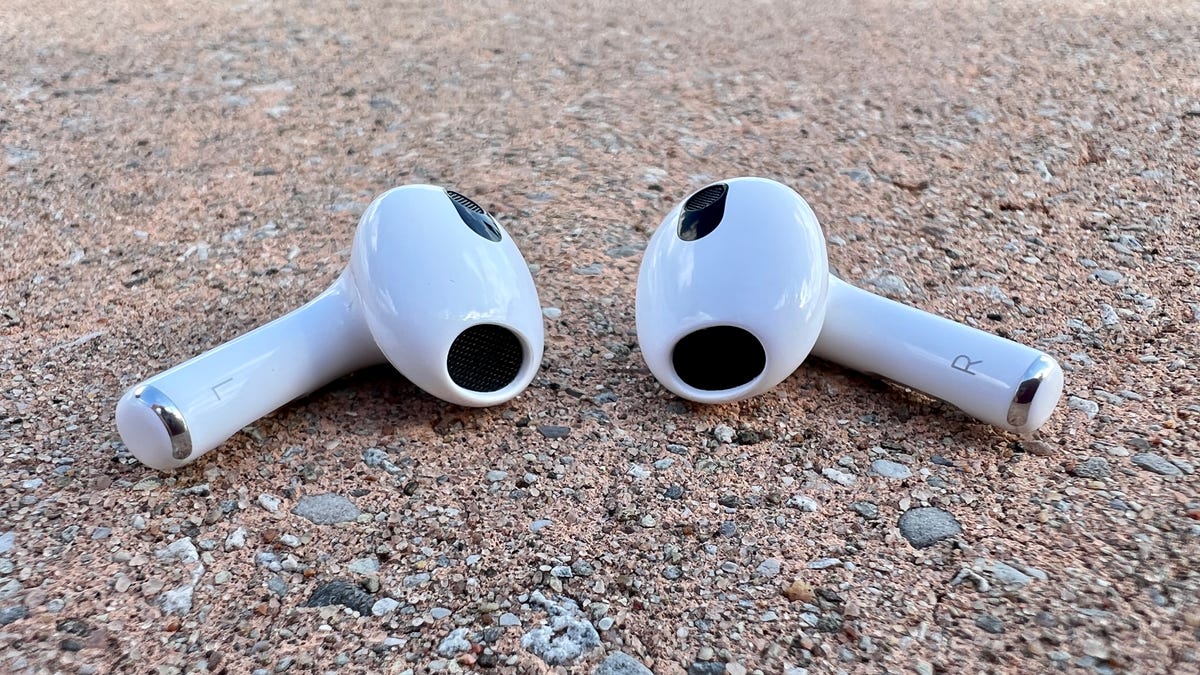
The case for the AirPods 3 sort of looks like a cross between the case for the standard AirPods and that of the AirPods Pro. It’s much shorter and wider than the entry-level AirPods case, but it’s not as wide as the holster for the AirPods Pro. You can also charge the case for the AirPods 3 or the AirPods Pro via Apple’s wireless MagSafe charger, or by plugging it in with a Lightning cable. But you’ll have to pay an extra $10 to get the MagSafe wireless charging case bundled with the AirPods 3. The MagSafe-compatible case for the AirPods Pro 2 also has a lanyard loop, unlike the AirPods 3’s case.
But the 2023 AirPods Pro 2 has a USB-C charging port instead of Lightning, which might make it a more convenient option for iPhone 15 owners who want to plug in their AirPods using the same cable. You can also charge the new AirPods Pro 2 by plugging them into your iPhone via USB-C. That’s important to consider if you’re leaning towards the AirPods Pro 2 and are deciding whether to buy new or refurbished.
The second-generation AirPods Pro’s case also has another capability: ultra wideband support. That essentially means the case has a built-in AirTag for easier location tracking.
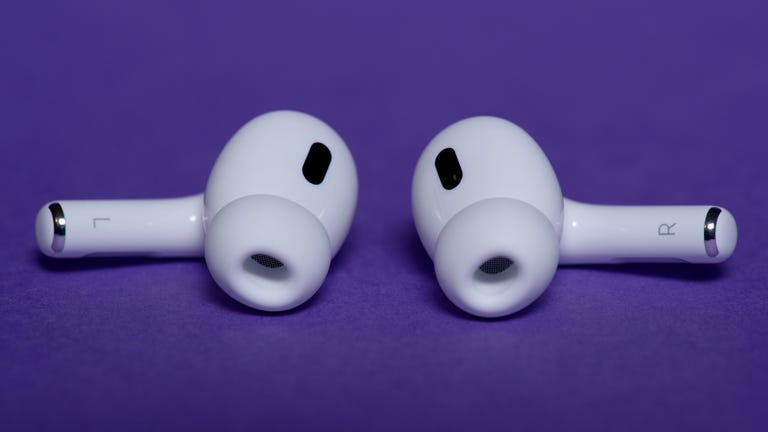
AirPods Pro 2 vs. AirPods 3: Audio
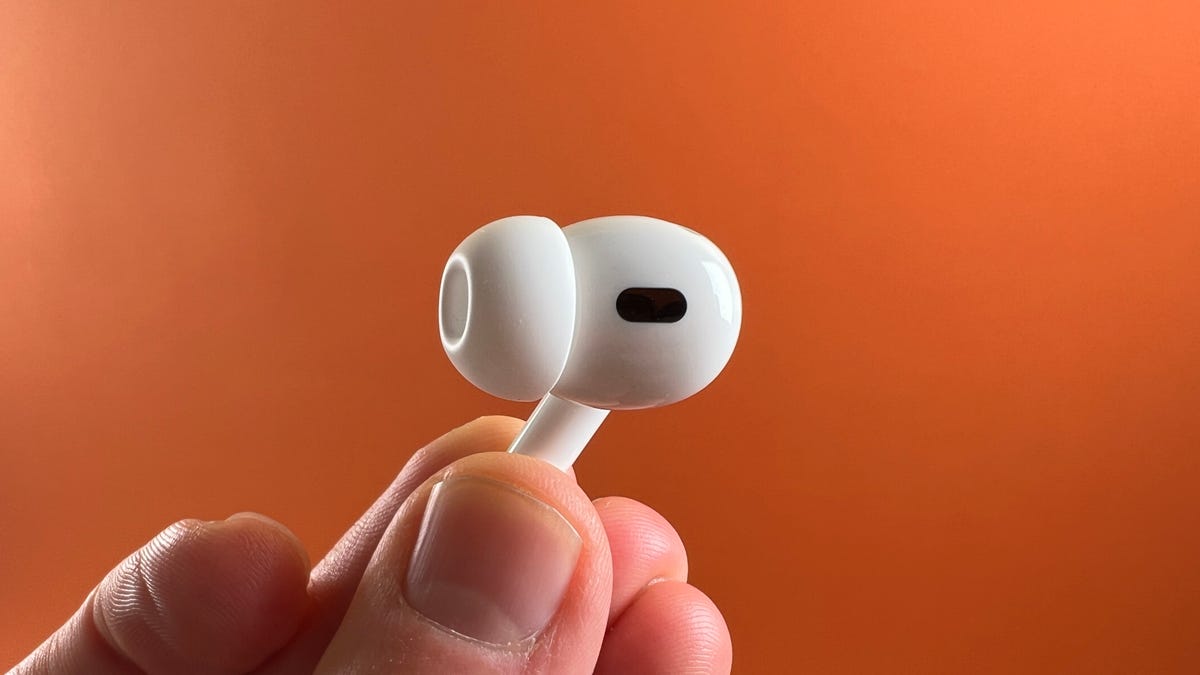
You’ll still have to splurge on Apple’s top-of-the-line earbuds to get active noise cancellation and transparency mode. Since the second-generation AirPods Pro have Apple’s new H2 chip, they can cancel up to twice as much noise as the previous AirPods Pro, according to Apple’s claims. Transparency Mode has also gotten an upgrade on the second-generation model. The new chip can reduce loud noises from your surroundings when in Transparency Mode, which should make sounds like a passing vehicle seem less jarring.
That H2 chip also brings improved audio to the AirPods Pro 2, further distinguishing them from the AirPods 3. As my colleague David Carnoy wrote in his review, the H2’s computational power helps the AirPods Pro process a broader range of frequencies.
You’ll also get swipe controls for managing volume levels on the AirPods Pro 2. The AirPods 3 just have Apple’s force sensors, which you can press to skip ahead, pause music or answer calls.
But both the AirPods Pro 2 and AirPods 3 have dynamic spatial audio and adaptive EQ. The former is essentially virtual surround sound, while the latter adjusts the sound to your ears.
AirPods Pro 2 vs. AirPods 3: Battery life
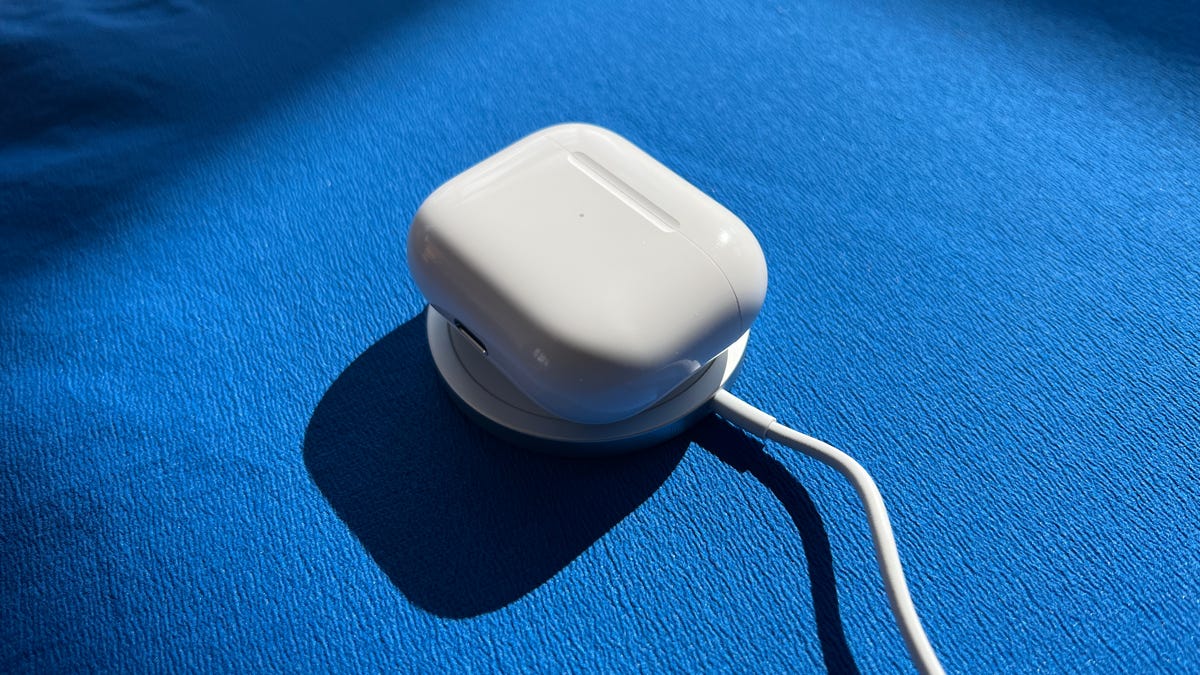
Battery life is similar for both models, although there are some slight differences. Both earbuds should provide up to 6 hours of listening time, according to Apple’s claims. But you’ll get 5.5 hours of battery life when using spatial audio and head tracking on the AirPods Pro 2, while the AirPods 3 offer slightly shorter 5-hour battery life with that surround sound feature enabled. Apple also claims the AirPods Pro 2 provides 4.5 hours of talk time, while the AirPods 3 offer up to 4 hours.
The case for both earbuds should provide up to 30 hours of listening time, says Apple. But when it comes to talk time, you can expect to get 24 hours from the AirPods Pro 2’s case and 20 hours from the AirPods 3’s case. Five minutes in each case is expected to replenish around one hour of listening time or roughly 1 hour of talk time.
AirPods Pro 2 vs. AirPods 3: How to choose
The AirPods Pro 2 are for those who want active noise cancellation, better audio and a more customizable fit. You’ll also get some other perks, like the ability to track them down more easily should they get lost, thanks to the U1 chip, and USB-C charging. The AirPods 3 are a more suitable choice if you don’t care about noise cancellation and prefer earbuds with an open design (and yes, they cost about $50 less, so they do offer some appeal to those on tighter budgets). At the same time, the AirPods 3 still have more to offer than the AirPods 2, which lack features like water resistance, adaptive EQ and spatial audio with head-tracking.

Apple AirPods Pro 2
The new AirPods Pro (2nd generation) are powered by Apple’s new H2 chip, which delivers more processing power while being more energy efficient, according to Apple. The new chip, combined with new low-distortion drivers, allows for improved sound that offers better clarity and depth. The noise canceling is also improved — Apple says the new AirPods have “double” the noise canceling of the original AirPods Pro. Additionally, the new AirPods add an extra hour of battery life, up from five to six hours with noise canceling on. Plus, a speaker in the case that emits a sound that helps locate your buds via Find My should they decide to hide from you.
Note that while Apple has discontinued the original AirPods Pro, they’ll remain on sale at discounted prices until supplies are exhausted. However, most people should get this newer model if they can afford it. The AirPods Pro 2 continue to see small discounts, dipping to as low as $223 during Amazon’ Early Access Prime event in October.
Read our Apple AirPods Pro 2 (USB-C) review.
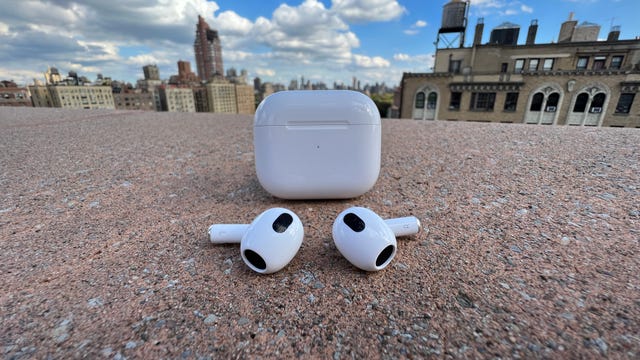
Apple AirPods 3
Take one look at the new design of the third-gen AirPods, and the first thing you’ll probably think is: “Those look like the AirPods Pro without ear tips.” You wouldn’t be wrong. While they’re more fraternal than identical twins, the AirPods 3 are shaped like the AirPods Pro, with the same shorter stems and same pinch controls as those of the Pro. Aside from the design change, which should fit most ears better than the AirPods 2nd Generation (though not very small ears), the biggest change is to the sound quality: It’s much improved. Also, battery life is better, and the AirPods 3 are officially water-resistant.

